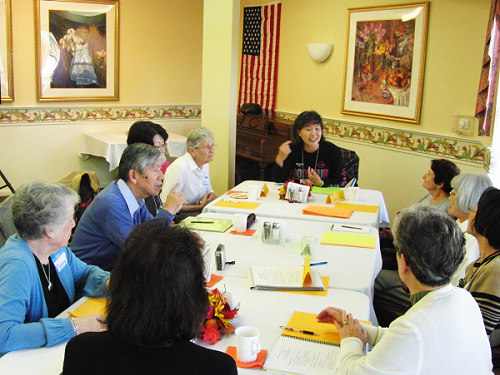International Exchange in Volunteerism
Volunteer Training Program at UM
ーFostering Volunteers who are engaging in elderly’s “Care for the Heart.”
The Univers Foundation screens approximately 15 Japanese volunteers who focus on the emotional care of the elderly, and hosts a week long training program at the University of Michigan by dispatching them. During the seminar, the instructors, who also have substantial understanding of health and welfare in Japan, give lectures, and participants are clearly able to learn the key role of active listening and the attitude of supporting the elderly’s heart.
In the beginning, the foundation used to send out volunteers to the University of Michigan every year since 1996, in order to train the “Univers Volunteers” which was established to support the elderly victims of the Great Hanshin-Awaji Earthquake. Though, in response to domestic and international appeals, the foundation has extended the applicants for training program to the public from 2008 and holds the program for those who provide care for the heart and active listening across the country.
Participants have opportunities to learn with case of “active listening,” “receptiveness,” and “empathy” through lectures. In addition, they are able to go to the site visit to the facilities, interact with local volunteers, and experience the actual activity by accompanying them. Furthermore, the curriculum is also focused on the experimental outdoor learning that they have fun learning about the teamwork and can take a second look as the opportunity.
This program is recommended for those who are being there for the elderly and provide emotional care for people who are afflicted by the disaster.
Training Program Report 2012
The foundation conducted the 5th training program from October 21 to October 28. 14 participants who were involved in volunteer activities were selected in public from around the country. Two of them participated from Iwate Prefecture which was the great-east-japan-earthquake-affected area. Under this circumstance, participating in the seminar provided them a strong motivation to make use of the experience and bring back to their hometown. Moreover, some of them have volunteered at active listening volunteer groups for long time, some just joined in the volunteer groups, and some of them even established NPOs to volunteer. In this way, those who had various experiences got together at this seminar. Not only developing one’s skill but also spreading the network among volunteers is the best part of the seminar.
On the first day of the seminar, participants had the opportunity to discuss and interact with “Peer Volunteers” who were working actively after volunteer training, at the “Turner Geriatric Clinic” belonged to the University of Michigan Geriatric Center. (*Peer means fellowship.) They were very open-minded to welcome the participants with warm atmosphere and everyone was able to positively ask questions. Japanese interpreter was available during the seminar.

On the second day, they tried “Challenge Program” that is the experimental outdoor learning. There are several activities and they deal with each activity as a team. They experienced the hands-on learning about the importance of existence of a leader, and communicating with others by placing yourself in the other person’s position. They genially commented on this program;
“I would like to bring back this program to Japan and try it in our organization.” “It has been a long time that I have so much fun!”
On the third day, they experienced of volunteering that they were divided into a group and accompany with local volunteers. Each of them participated in different activities such as friendly visit and delivered meal service. Even in a short time, they felt so much through engagement with people. From the group of participants who participated in the friendly visit activity, they were impressed by the relationship between volunteers and the elderly of friendly visit. Their relationship was very natural like longtime friends, not like the one that volunteers are the supporters and elderly is the side of being supported by them. All participants talked about their own experiences very excitedly.
Afterwards, training program continued very productively that participants attended the case-based lecture and went site-visit to regional institutions where volunteers play important roles. Through the program, each participant acquired some clues to face with issues they were feeling in and the new perspective to set the direction of future activity. This program drew great encouragement from sharing the experience and learnings with like-minded peers.
Emotional Care Forum
Volunteers Training Program at the University of Michigan has been conducted for the purpose of providing the opportunity that volunteers are able to learn how important to emphasize with other people’s feelings, accept others, and provide active listening.
The Great East Japan Earthquake occurred on March 11, 2011. Emotional care for the disaster victims deeply wounded are needed. There are great expectations to the role of active listening volunteers.
Under such circumstances and as part of Volunteers Training Program at the University of Michigan, the foundation invited specialists of volunteer activities and emotional care and held “Thinking of Emotional Care Forum,” in partnership with organization of the Tohoku area members who participated in the univers training program in Michigan.
We hope you find our website informative for those who are committed to emotional care and active listening volunteer activities.
